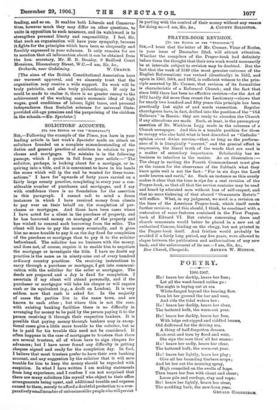PRAYER-BOOK REVISION.
[To TEE EDITOR OP TEN "SPICTATOIL"]
trust that the letter of Mr. Cremer, Vicar of Eccles, in your issue of December 22nd, will attract attention. Whether the compilers of the Prayer-book had definitely before them the thought that their own work would necessarily be at intervals subject to revision may be doubted. But the fact that the work of 1549 (the most genuine outcome of the English Reformation) was revised (drastically) in 1552, and again in 1560, 1604, and 1662, is sufficient witness to the prin- ciple asserted by Mr. Cremer, that revision of its formalities is characteristic of a Reformed Church ; and the fact that since 1662 there has been no effective revision—for the Act of 1872 hardly did more than recast the Lectionary—shows that for nearly two hundred and fifty years this principle has been practically lost sight of and needs reassertion. Regular churchgoers have, in fact, drifted into the position of the "Old Believers" in Russia: they are ready to abandon the Church if any alterations are made. Such, at least, is the peremptory assertion of Dr. Wickham Legg made in the columns of Church newspaper. And this is a tenable position for those to occupy who also hold what is best described as " Catholic opinion about divine service,—that, so long as the perform- ance of it is liturgically "correct," and the general 'effect is impressive, the literal truth of the words that are used is a matter of secondary importance. Scholarship has no business to interfere in the matter. As an illustration :- The clergy in reciting the Fourth Commandment must give as the reason for the observance of the Sabbath what they know quite well is not the fact : "For in six days the Lord made heaven and earth," &c. Such an instance as this surely makes it clear that the time is ripe for a real .revision of the Prayer-book, so that all that the service contains may be read and heard by educated men without loss of self-respect, and that no mere tinkering of that absurd "Ornaments Rubric" will suffice. What, in my judgment, we need is a revision on the lines of the American Prayer-book, which itself needs further revision; and this should, I think, be combined with a restoration of some features contained in the First Prayer,- book of Edward VI. But rubrics concerning dress and church ornaments would better be placed in a new set of authorised Canons, binding on the clergy, but not printed in the Prayer-book itself. And friction would probably be avoided if a fairly long period, say five years, were allowed to elapse between the publication and authorisation of any new book, and the enforcement of its use.-7-I am, Sir, 8:13.,


































 Previous page
Previous page